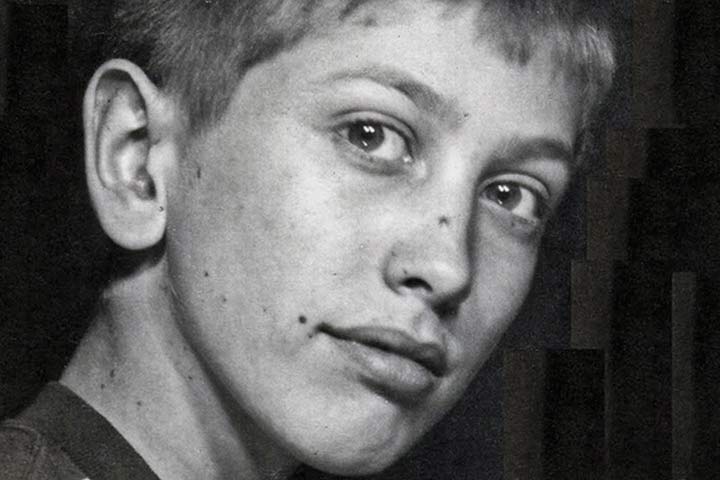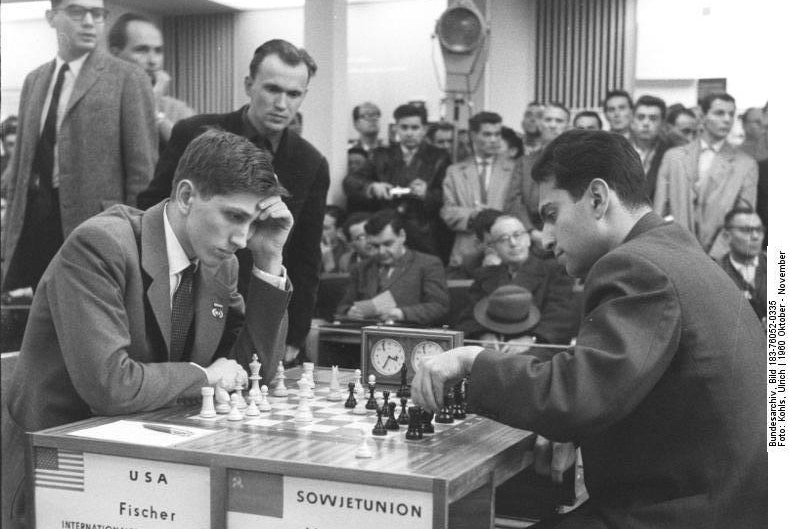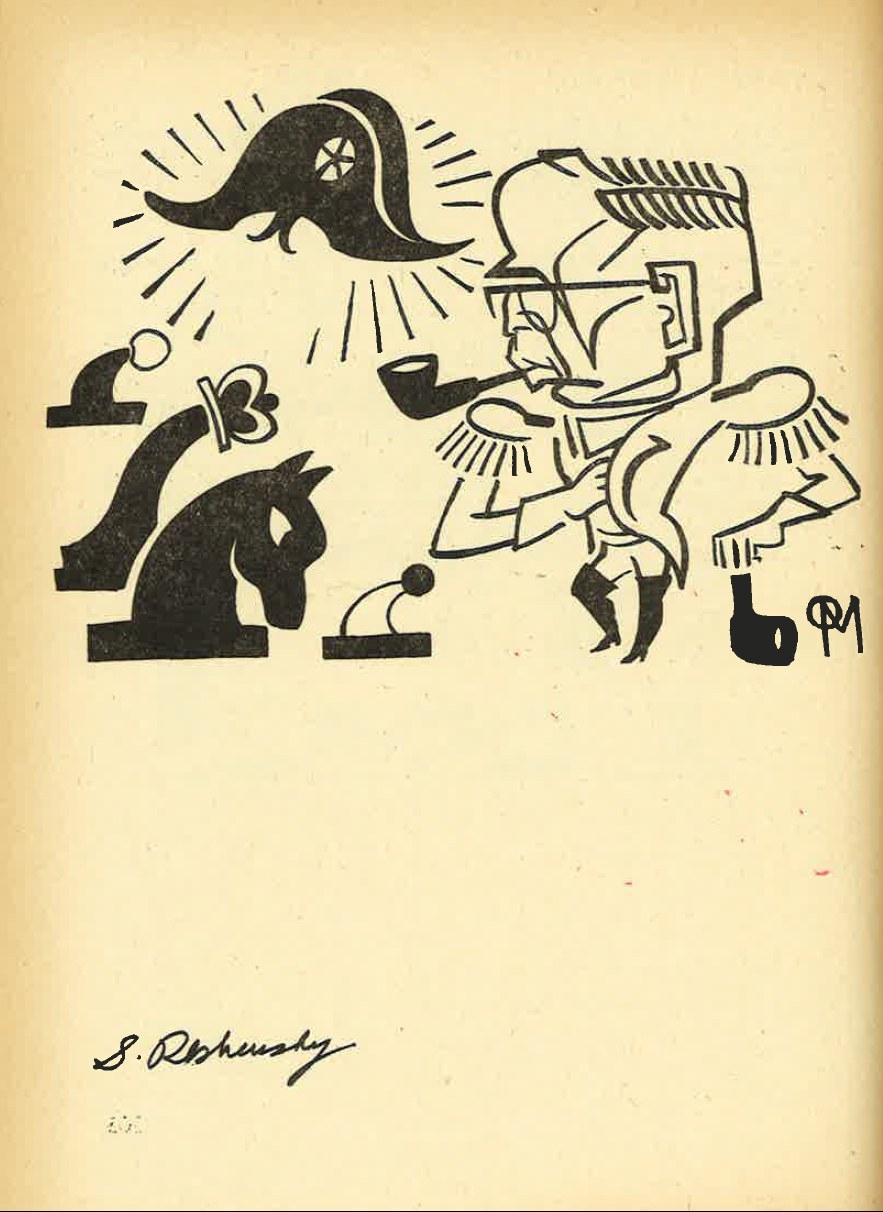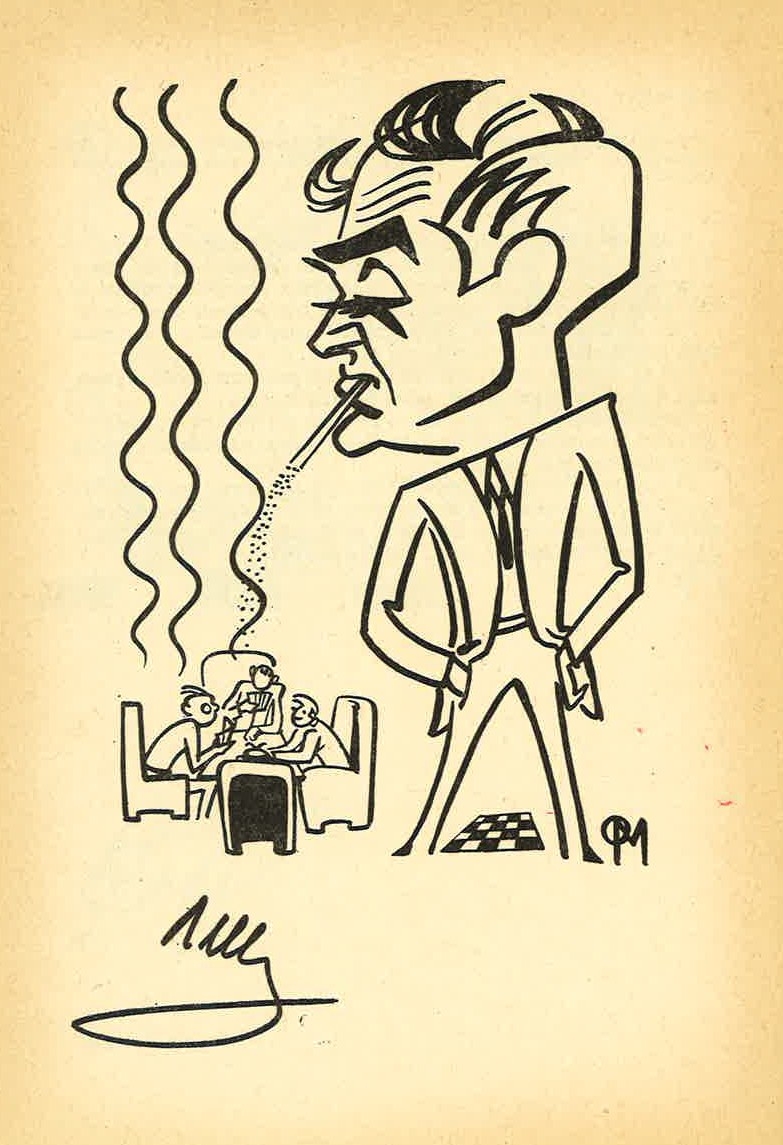


A lot has been written about Fischer's games and life, almost everything is known. The famous American psychiatrist and former world class chess player Reuben Fine attested his brilliant countryman "serious mental issues, resulting from family conflicts, that led to displays of behavioural problems." According to Fine chess offered Fischer an opportunity to use his sucess to take revenge for mortifications and to act out fantasies of powers. "I want to break his ego," was Fischer's number one goal!
Does Reuben Fine's psychoanalysis help to understand the behaviour of Robert Fischer better or even to forgive him a lot of things? However, both, Fine and Fischer, totally agreed on one thing: they believed that the Russians (later Soviets) were ready to do everything to keep the chess crown. The protest by the americans eventually led the FIDE to replace the candidate tournaments with "one-on-one" candidate matches.
Joseph Vissarionovich Stalin (Jughashvili) found chess a good but first of all cheap publicity for the the new socialist society. While Russia suffered enormous hunger in the 1930s, highly renumerated international chess tournaments were played in Moscow. Western grandmasters were courted and paid royally because the socialist doctrine was: "In chess, we are just better than the West!" And indeed, after World War II the Soviet state-supported chess machine gained many laurels.
The match of the century – Fischer vs Spassky, Reykjavik 1972 – was highly political. The ideology of the West and the ideology of the East clashed like two gamecocks. Capitalism is known to make social mistakes, socialism makes capital mistakes!
The self-taught Fischer, a simple American, was presumptous enough to challenge the entire Soviet chess power. I was lucky to meet three brilliant chess personalities, Robert Fischer, Garry Kasparov, and Mihail Tal. For me, Bobby is definitely the strongest World Champion of all times.
But when did we meet for the first time? USA-CSSR, Chess Olympiad, Leipzig 1960. Fischer took a time-out but seemed to be very interested in the game on board four, Hort-Weinstein. In mutual time-trouble I overlooked a knight fork, attacking queen and both rooks. Quel malheur! But fortunately my opponent then made one mistake after the other and our famous kibitz was aghast. His expression was easy to interpret: "I wish I could have played with Black…"
Of course, I learnt the game Fischer-Tal, Leipzig 1960, by heart.

Fischer-Tal | Photo: Ulrich Kohls, Bundesarchiv
Chess Olympiad in Varna 1962. From afar I enthusiastically followed Bobby's successes and I still remember the game Botvinnik vs Fischer as a masterpiece about the topic "How to play the Grünfeld Defense?".
The bus to the airport was filled to capacity. The participants of the chess olympiad wanted to go home. Robert Fischer was last to arrive. He dragged a wonderful, blue but enormous trunk with him. Jan Hein Donner was enraged: "Stay where you are or sit on the bonnet but let us go!"
Fischer's Sicilian was very hard to copy but I found it much easier to buy a trunk in Prague that was identical to Fischer's. From then on I dragged the monster as my personal lucky charm to all my tournaments. At that time Fischer fans could buy a sticker, with the slogan "1.e2-e4, best by test" printed on it. That made me change my opening repertoire in favour of the Open Games. With success!
Vinkovci 1968 – a tournament with sufficient rest days, today rather unusual. On one such rest day all participants and all organisers met on a different playing ground, the soccer field. Fischer only knew American Football. Soccer was totally unknown to him. He saw the round, leathery ball for the first time. But his physical stamina was remarkable. It did not take long to explain the rules to him. But after the start of the game he was running after the ball with the elegance and speed of a panther. We all had a lot of fun and Bobby seemed to enjoy dribbling with the ball.

Drawing: Otakar Masek
"Vlasty, they are pushing the small ball into the hole and they take all the money," was his constant and annoyed comment about the high fees in golf.
In Vinkovci, at the swimming pool of the villa in which Bobby stayed, I became witness to an exercise he probably practiced regularly. Midnight was close when he suddenly snatched a stopwatch. "Now we will see some freesytle swimming," I thought. But no, instead he angled a sheet of paper with chess exercises from his trouser pocket - "mate in two". He pressed the clock and tried to solve the ten little chess tasks in less than a minute. That's how he ended the day. The readers perhaps guessed that I then did not only copy Fischer by playing the Open Games!
Interzonal Tournament in Sousse 1967 – we lived in the Hilton, close to the beach. Every day, from early morning to late evening the inviting, large swimming pool of the hotel was the meeting point of the grandmasters, seconds, and companions. "Gens una summus".

Drawing: Otakar Masek
But where was the tournament favourite, Bobby Fischer? The American left the tournament, came back, and vanished again. FIDE versus Fischer! Whether he would return once again to play the tournament till the end, was the big question. Samuel Reshevsky was his next opponent. Back then there was no no-tolerance-rule, the players had one hour to appear at the board before the game was forfeited. This hour was almost over but Bobby was not there. Would he indeed forfeit on time? Absolutely calm, as if it was the most normal thing in the world, two minutes before the game was forfeited, a perfectly dressed young man entered the tournament hall. This led to an unforgettable Ruy Lopez. Veni, vidi, vici!
But before the next rest day the star vanished again. The confused arbiters telephoned nervously and non-stop with the FIDE office. Fischer's results were cancelled. The arbiters pasted over all his results in the tournament table which stood in the middle of the hotel lounge. Reshevsky was very glad that his "0" was pasted over, after all, six places in the candidates were at stake.

Drawing: Otakar Masek
"If the guy comes back again, I will leave," was his angry comment. Should we really take his ultimatum seriously?
| Rg. | Title | Name | 1 | 2 | 3 | 4 | 5 | 6 | 7 | 8 | 9 | 10 | 11 | 12 | 13 | 14 | 15 | 16 | 17 | 18 | 19 | 20 | 21 | 22 | Pts. |
| 1 | GM | Bent Larsen | 0 | ½ | ½ | 0 | 1 | 1 | 1 | 1 | ½ | 1 | 1 | ½ | 1 | 0 | 1 | ½ | 1 | 1 | 1 | 1 | 1 | 15.5 / 21 | |
| 2 | GM | Viktor Lvovich Kortschnoj | 1 | ½ | ½ | 1 | ½ | ½ | ½ | 0 | ½ | 0 | 0 | 1 | ½ | 1 | 1 | 1 | 1 | 1 | 1 | ½ | 1 | 14.0 / 21 | |
| 3 | GM | Svetozar Gligoric | ½ | ½ | ½ | ½ | ½ | ½ | 1 | ½ | ½ | ½ | ½ | 1 | ½ | 1 | ½ | ½ | ½ | 1 | 1 | 1 | 1 | 14.0 / 21 | |
| 4 | GM | Efim P Geller | ½ | ½ | ½ | ½ | 1 | 0 | ½ | 1 | ½ | 1 | ½ | ½ | ½ | 1 | ½ | ½ | 1 | 1 | ½ | 1 | 1 | 14.0 / 21 | |
| 5 | GM | Lajos Portisch | 1 | 0 | ½ | ½ | ½ | ½ | 1 | 0 | ½ | ½ | ½ | 1 | ½ | 1 | ½ | 1 | ½ | 1 | ½ | 1 | 1 | 13.5 / 21 | |
| 6 | GM | Vlastimil Hort | 0 | ½ | ½ | 0 | ½ | ½ | 1 | ½ | ½ | ½ | 1 | ½ | ½ | ½ | ½ | ½ | 1 | 1 | 1 | 1 | 1 | 13.0 / 21 | |
| 7 | GM | Samuel Herman Reshevsky | 0 | ½ | ½ | 1 | ½ | ½ | ½ | 1 | ½ | 1 | ½ | ½ | ½ | ½ | ½ | 1 | 1 | 1 | 0 | 1 | ½ | 13.0 / 21 | |
| 8 | GM | Leonid Stein | 0 | ½ | 0 | ½ | 0 | 0 | ½ | ½ | ½ | 1 | ½ | ½ | 1 | 1 | 1 | 1 | 1 | 1 | 1 | 1 | ½ | 13.0 / 21 | |
| 9 | GM | Milan Matulovic | 0 | 1 | ½ | 0 | 1 | ½ | 0 | ½ | 0 | 1 | 1 | 1 | ½ | 0 | ½ | ½ | 1 | ½ | 1 | 1 | 1 | 12.5 / 21 | |
| 10 | GM | Aleksandar Matanovic | ½ | ½ | ½ | ½ | ½ | ½ | ½ | ½ | 1 | 1 | ½ | ½ | ½ | ½ | ½ | 1 | ½ | 1 | 0 | ½ | ½ | 12.0 / 21 | |
| 11 | GM | Henrique Mecking | 0 | 1 | ½ | 0 | ½ | ½ | 0 | 0 | 0 | 0 | 1 | 1 | 1 | 1 | ½ | ½ | ½ | ½ | 1 | 1 | ½ | 11.0 / 21 | |
| 12 | GM | Borislav Ivkov | 0 | 1 | ½ | ½ | ½ | 0 | ½ | ½ | 0 | ½ | 0 | ½ | ½ | 1 | ½ | 1 | ½ | 0 | 1 | 1 | 1 | 11.0 / 21 | |
| 13 | GM | Lubomir Kavalek | ½ | 0 | 0 | ½ | 0 | ½ | ½ | ½ | 0 | ½ | 0 | ½ | ½ | ½ | 1 | ½ | 1 | 1 | 0 | 1 | 1 | 10.0 / 21 | |
| 14 | GM | Aivars P Gipslis | 0 | ½ | ½ | ½ | ½ | ½ | ½ | 0 | ½ | ½ | 0 | ½ | ½ | 0 | 1 | ½ | 0 | ½ | 1 | 1 | 1 | 10.0 / 21 | |
| 15 | GM | Duncan Suttles | 1 | 0 | 0 | 0 | 0 | ½ | ½ | 0 | 1 | ½ | 0 | 0 | ½ | 1 | ½ | 1 | 0 | 1 | ½ | ½ | 1 | 9.5 / 21 | |
| 16 | GM | Istvan Bilek | 0 | 0 | ½ | ½ | ½ | ½ | ½ | 0 | ½ | ½ | ½ | ½ | 0 | 0 | ½ | ½ | ½ | 0 | 1 | 1 | 1 | 9.0 / 21 | |
| 17 | GM | Laszlo Barczay | ½ | 0 | ½ | ½ | 0 | ½ | 0 | 0 | ½ | 0 | ½ | 0 | ½ | ½ | 0 | ½ | ½ | ½ | 1 | ½ | 1 | 8.0 / 21 | |
| 18 | GM | Robert Eugene Byrne | 0 | 0 | ½ | 0 | ½ | 0 | 0 | 0 | 0 | ½ | ½ | ½ | 0 | 1 | 1 | ½ | ½ | ½ | 1 | ½ | 0 | 7.5 / 21 | |
| 19 | IM | Lhamsuren Myagmarsuren | 0 | 0 | 0 | 0 | 0 | 0 | 0 | 0 | ½ | 0 | ½ | 1 | 0 | ½ | 0 | 1 | ½ | ½ | 1 | 0 | 1 | 6.5 / 21 | |
| 20 | IM | Miguel Cuellar Gacharna | 0 | 0 | 0 | ½ | ½ | 0 | 1 | 0 | 0 | 1 | 0 | 0 | 1 | 0 | ½ | 0 | 0 | 0 | 0 | 1 | 1 | 6.5 / 21 | |
| 21 | IM | Ortvin Sarapu | 0 | ½ | 0 | 0 | 0 | 0 | 0 | 0 | 0 | ½ | 0 | 0 | 0 | 0 | ½ | 0 | ½ | ½ | 1 | 0 | ½ | 4.0 / 21 | |
| 22 | GM | Slim Bouaziz | 0 | 0 | 0 | 0 | 0 | 0 | ½ | ½ | 0 | ½ | ½ | 0 | 0 | 0 | 0 | 0 | 0 | 1 | 0 | 0 | ½ | 3.5 / 21 |
But Fischer kept missing. As the table shows, three players profited from the conflict between Fischer and the FIDE: Reshevsky, Hort, and Stein.

Drawing: Otakar Masek
Back then, Fischer was revered like a Hollywood star in Yugoslavia. In the small slavonic city of Vinkovci it was first of all the enthusiastic organiser Bilusic who in 1967 took care that the American felt like home. Bobby was allowed to occupy several rooms and he was the only one who was allowed to use the swimming pool of Bilusic's luxurious villa. One morning, a rather funny scene occurred. Fischer was sitting at the chess board, a boy of 10 or 11 years of age sitting opposite him. It was the son of his host.
Actually, Fischer and I were supposed to meet and I was astonished to see the two at the board. Moreover, without a chess clock. My little Renault 8 was washed and dressed up for the famous passenger. I was Bobby's trusted driver but outside of the city I was never to go more than 50 miles per hour. When driving with him I also had to take meticulous care of all traffic signs.
The little boy was on the verge of tears. He was an absolute beginner and lost one game after the other. Fischer always played the strongest moves and mated his opponent without pity when he had the chance. I thought the master could have given the apprentice queen odds. Although soaked in in sweat, after each game Fischer, with a questioning look at the boy, brought the pieces back to the starting position. "What do you think, Vlasty, shall I give him a draw?"
Did he feel obliged to the host or did he want to give the boy a happy and unforgettable memory? At any rate, I did not want to meddle with his decision.
Apparently, the intensive washing of my Renault had been in vain. But in my position as kibitzer I kept neutral and remained silent. But observed the desparate attempts of the young student to prolong the games as much as possible. But Fischer did not give in, the boy's king had to continue its agony. Eventually, I left the imposing villa tactfully and inconspicuously. Therefore, I still don't know how long the two "new chess buddies" had faced each other…
The deep forests in Slavonia are a paradise for mushroom pickers. I learnt mushroom picking from my father when I was seven years old. After the war mushrooms were an important food in my homecountry and helped to survive. The early need later turned into a great passion. The forest is my home. The chef of the hotel Kunjevci was happy about my pickings, and deliciously prepared yellow belotuses complemented my daily menu. The tournament in Vinkovci 1968 was in full swing and so was the mushroom season. I usually went mushroom picking around noon. One day, while leaving, I met Bobby Fischer. "Yes, I collect mushrooms. Will you join me?" He turned around on his heel and a few minutes later he was back again. I controlled his equipment – good footwear, a jackknife, and a spacious basket. Everything okay.
But I wondered whether he had ever been in a forest before? He rushed to everything that had one leg and was colourful. I was glad that he did not know about my adventure from the day before. Encountering a wild boar with her five piglets had frightened even me. We filled our baskets quickly and without trouble found the way back to the hotel. Robert Fischer was absolutely delighted, about the excursion and his pickings. I controlled his basket. "Oh dear, only a few grams of those and you would never win the tournament, dear Robert." He did not want to believe me and was very upset when I tossed his mushrooms into the next trash can. His face was very similar to fly agarics, only the white dots were missing. "If you are lucky, an immediate gastric lavage might help," I concluded my mycological lecture.
"In the last days I have eaten too many mushrooms," I told the chef. "Today, I take only the pancakes, Robert Fischer will get the mushrooms. But, please, prepare them in a way that will allow him to still win the tournament," I joked. During this conversation Bobby did not leave my side. Suddenly he understood Serbo-Croatian. For him enough was enough. "No, no Vlasty, you will eat them first and I will wait for one hour."
I immediately remembered the roman empress Agrippina, mother of Nero, who had poisoned a lot of people she did not like in her surroundings with mushroom dishes. I felt flattered - after all, I was made food taster of James Robert Fischer!
Translation from German: Johannes Fischer